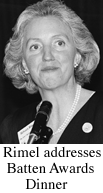Summer 1996
Investing in Risk: Re-engaging the Public
Rebecca W. Rimel
President
The Pew Charitable Trusts
The Pew Center was an experiment when we got involved. It was, if you will, a risky investment, particularly for an institution like ours, which comes out of an anonymous grant-making history.
And by our measure, and obviously by yours in giving of your time today, it’s been a success. So I will be recommending to our board a renewal of this program for another three years and a commitment for the decade to civic journalism.
Like everyone in this room, we’re very interested in reviving and responding to the needs of a healthy democracy. That’s our interest in this project and our interest in working with the press. Each of you has your own risks to the current challenges to our democratic tradition, whether it’s the movies or money, whether it’s the press or politics, everybody takes their knocks in terms of what’s ailing this country, why the public, our institutions, our ideas are under attack. The public is deeply cynical. We lack the social trust, and the social will, to get reconnected and re-engaged.

Many people feel helpless to make a difference. And unfortunately, that’s leading to a great deal of hopelessness. This we all feel is a formula for disaster. What we really need to do is be about re-engaging the public, and we often say, renewing our democratic heart.
We’re asked a lot about why the Pew Trusts is interested in journalism in this initiative and several other very important efforts we have underway. We’re interested because the press plays such an important role in informing the public and re-engaging people in their communities, in public life, in civic affairs, and what makes this country great.
Do we have a master plan? Yes, we want to be about funding the best ideas and the best individuals that are going to put this country back on course, and reinvigorating, and reinventing, if you will, our communities. Do we have an overall agenda? Yes, that’s it.
Some skeptics and critics have asked us: Are we in some way interfering too much with the objectivity of very important institutions like the press? We certainly say, we hope not. That’s not our agenda. Ours is basically to get the flexible support for wise people to think hard about the role and the impact that their institutions are having in a healthy democracy.
We’ve been asked if we’re practicing checkbook democracy — a term that was new to me, given to us by our local press. Were we interfering in what is the role of elected officials and independent institutions? Our answer is: We hope not. But if we are, discipline us and discipline us well, because what we’re about, if anything, is perhaps an ineptness to communicate well our deep concern for the health of this country and the important role that each and every one of us plays.
The press has extraordinary power. Power to manipulate or to motivate. Power to increase people’s cynicism or to increase their commitment. You have the power to give voice to innovative ideas, to individuals and institutions. In fact, under the net of the Pew Trusts we’re trying to find people who can motivate the public and give us new ideas.
You know some of our work. We’re delighted with Andy Kohut’s enormous success through the Pew Research Center for People in the Press. And yes, Paul Taylor came to us to talk about his efforts, not only for free time for candidates but his concern about how the press can be more of a tool in restoring social trust in this democracy.
We’re working with Bob Putnam. Hopefully we can move people from the question of bowling alone to — I was trying to think of the other side of that — maybe that’s curling together. I don’t know. We’re working with MTV and Rock the Vote because they reach young people and they have a way of connecting young people back to politics, back to people, and back to their communities.
We’re just getting ready to announce a commission on civic renewal. . . So as you can see, there’s a whole range of initiatives. We’re trying a lot of adventuresome, risky ideas. Hopefully when it’s all said and done people will say: That institution was prepared to invest in some extraordinarily talented individuals; some failed, some succeeded, but the country at least is listening to itself and re-engaging in what’s so important to a healthy democracy. Maybe you could say what we’re about is helping America to re-find its center, to blunting the extremes and allowing individuals to talk with one another, to get reconnected.
In fact, though, we need to come back to the important role of the press. I recall a quote from a person whom we’re here to honor, Jim Batten, when he reminded us that newspapers are not just another commercial enterprise. For two centuries, undergirded by the Bill of Rights, they have been an indispensable balance wheel of American democracy.
They’re providing, in my words, not only the balance but the will and the way as we re-find our democratic heart.
